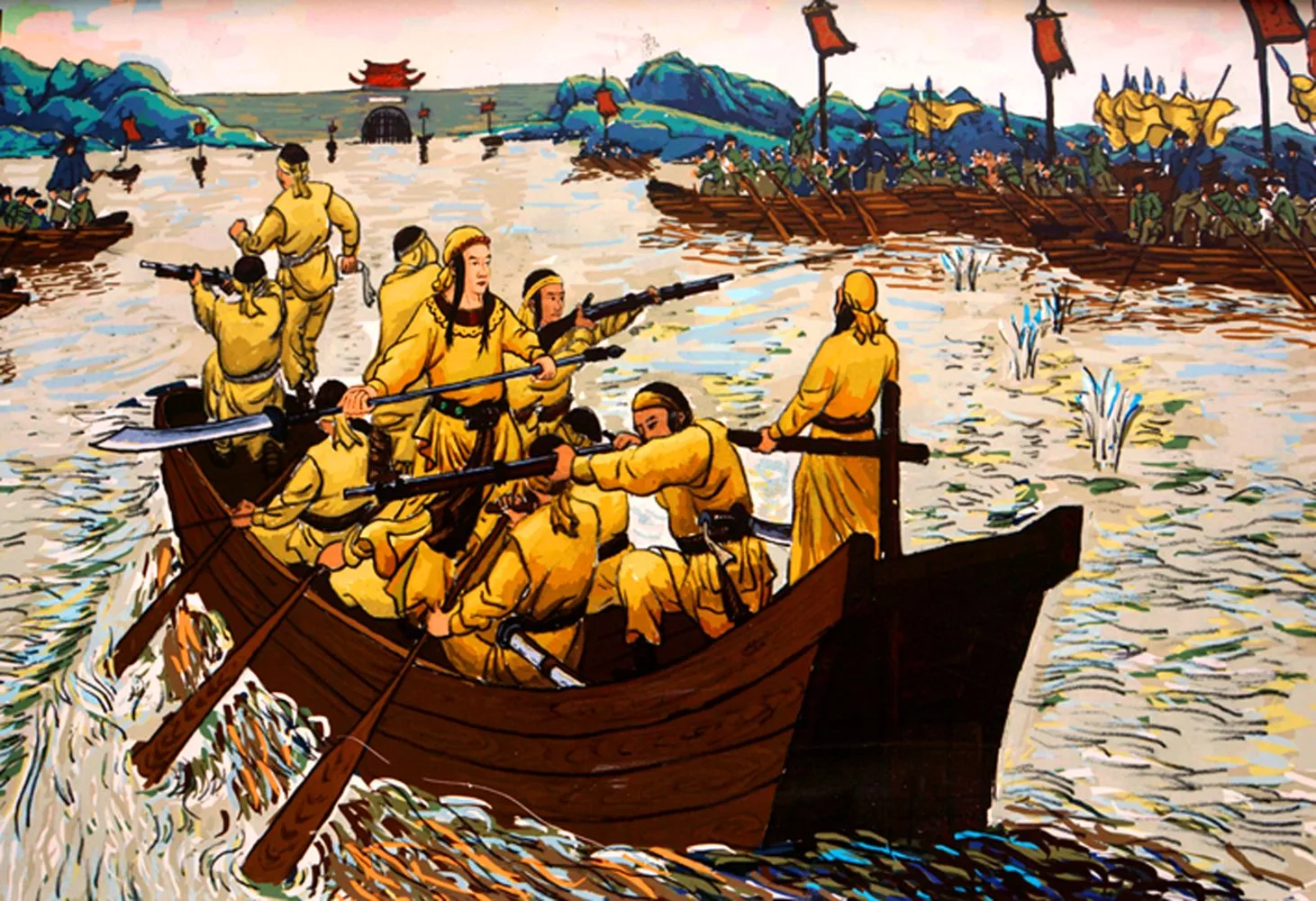The Taiping Rebellion (1850–1864) remains one of the deadliest and most significant civil wars in human history, yet it is often overlooked outside of China. Led by Hong Xiuquan, a self-proclaimed messianic figure, the rebellion sought to overthrow the ruling Qing Dynasty and establish a utopian, quasi-Christian kingdom. Over the course of fourteen brutal years, the conflict resulted in the deaths of an estimated 20 to 30 million people, making it one of the bloodiest wars ever fought.
The rebellion reshaped China’s political, social, and economic landscape, leaving a legacy that influenced future uprisings and revolutions. It was not only a military confrontation but also a radical social upheaval, with the Taiping vision for governance challenging centuries-old traditions. The Taiping leaders sought to implement widespread reforms, including gender equality, land redistribution, and the rejection of traditional Confucian practices, all of which threatened the existing societal order.
The causes of the rebellion were rooted in a complex interplay of religious fervor, economic hardship, and deep-seated dissatisfaction with the ruling elite. Widespread famine and corruption had made life unbearable for many peasants, who saw in Hong Xiuquan a leader capable of delivering them from suffering. Meanwhile, foreign incursions and the Qing court’s inability to address internal strife created an environment ripe for insurgency. As the Taiping forces gained ground, their radical ideology attracted not just the oppressed masses but also intellectuals and former government officials disillusioned with Qing rule.
This article explores the origins, key events, and ultimate consequences of this catastrophic yet fascinating period in Chinese history, shedding light on the intricate factors that contributed to one of the most devastating and transformative conflicts of the 19th century.
The Roots of Rebellion
The Decline of the Qing Dynasty
By the mid-19th century, the Qing Dynasty was plagued by corruption, economic instability, and internal strife. Foreign imperialist powers, particularly Britain and France, had weakened China’s sovereignty through the Opium Wars, forcing humiliating treaties that drained the economy. The Treaty of Nanjing (1842) and the subsequent treaties ceded crucial ports to European control, exacerbating resentment among the Chinese populace. The growing influence of Western traders, missionaries, and foreign concessions further undermined Qing authority, leading to widespread discontent among both elites and commoners alike.
Meanwhile, China’s agricultural system was under extreme strain. Overpopulation in the fertile river valleys of the south led to land shortages, and poor harvests triggered devastating famines. As peasant farmers struggled under the burden of heavy taxation, local landlords and corrupt officials exploited them, further deepening their misery. The state’s failure to implement effective relief measures only amplified the suffering, turning many desperate individuals toward radical movements promising change.
Adding to the crisis, natural disasters such as floods and droughts devastated large portions of the countryside, intensifying food shortages and forcing waves of migration. Many displaced peasants became bandits or joined emerging secret societies that opposed the Qing government. These conditions created a volatile environment ripe for rebellion, as disillusioned citizens sought alternatives to a failing dynasty.
Amid this chaos, millenarian movements flourished. Inspired by a mix of religious prophecy and social reformist ideas, these groups called for the overthrow of the Qing rulers, whom they viewed as corrupt and incapable of governing. The most prominent of these movements was led by Hong Xiuquan, a failed scholar who claimed divine inspiration and envisioned a new, just society under his rule.
The Rise of Hong Xiuquan
Hong Xiuquan was a failed scholar who, after experiencing a series of intense visions, came to believe he was the younger brother of Jesus Christ and was chosen by God to rid China of the corrupt Qing rulers. After repeatedly failing the imperial examinations, Hong withdrew into religious study, eventually developing a unique ideology that blended elements of Christianity, Confucianism, and communalism. His teachings drew heavily from Christian doctrine but were infused with Chinese millenarianism and anti-Qing sentiment, which positioned the ruling dynasty as the ultimate evil in need of eradication.
Convinced he had a divine mission to establish a new heavenly kingdom on Earth, Hong began actively spreading his message, gaining an enthusiastic following among disenfranchised peasants, unemployed laborers, and ethnic minorities. His ideology particularly resonated with the Hakka people, a marginalized ethnic subgroup often ostracized by mainstream Chinese society. Many Hakka, long subjected to discrimination and exclusion from political and economic opportunities, found hope in Hong’s vision of an egalitarian society free from Qing oppression.
The movement grew rapidly, fueled by growing resentment toward local landlords, corrupt officials, and foreign economic exploitation. By the early 1850s, thousands had joined Hong’s cause, drawn not only by his promises of spiritual salvation but also by his calls for sweeping social and economic reforms. The Taiping Heavenly Kingdom, as his movement came to be known, sought to redistribute land, abolish private property, and eliminate Confucian traditions, including foot-binding and the subjugation of women. Hong’s strict moral codes, which included bans on alcohol, gambling, and polygamy, further distinguished his movement from mainstream Chinese society.
Hong’s radical vision and ability to inspire devotion among his followers transformed what began as a religious movement into a full-scale revolutionary campaign. His forces, organized under military-style discipline, soon challenged Qing rule directly, leading to one of the bloodiest conflicts in Chinese history.
The War Begins
Early Victories and Expansion
In 1850, Qing forces attempted to suppress Hong’s growing movement, sparking open conflict. The Taiping rebels quickly gained momentum, establishing a disciplined and highly motivated army. By 1851, Hong declared the Taiping Heavenly Kingdom, naming himself the Heavenly King. The movement rapidly gained support among disillusioned peasants and anti-Qing factions. The Taiping army, composed of fervent believers, employed highly organized military strategies that allowed them to capture significant territory.
In 1853, the Taiping captured Nanjing, a major strategic and cultural center, and declared it their capital, renaming it Tianjing (Heavenly Capital). This victory marked the height of their power, as they controlled vast territories in southern China, including Jiangxi, Hunan, and Zhejiang provinces. At their peak, the Taiping army numbered between 1 to 2 million soldiers, rivaling the Qing forces. Their radical social policies, including land redistribution, gender equality, and the abolition of foot-binding and opium use, made them both revolutionary and controversial. The implementation of these policies, however, was often chaotic and met with resistance from local elites.
Internal Struggles and Imperial Counterattack
Despite their early successes, the Taiping suffered from internal divisions and strategic miscalculations. Hong Xiuquan’s leadership became increasingly erratic, as he retreated into religious seclusion, leaving key military decisions to his subordinates. Factional infighting among Taiping commanders, including Yang Xiuqing, Wei Changhui, and Shi Dakai, further weakened their movement. By 1856, paranoia and power struggles led to violent purges within the leadership, destabilizing the rebellion from within. Discontent within the ranks led to desertions, reducing the effectiveness of the once-formidable Taiping army.
Meanwhile, the Qing Dynasty, initially caught off guard, regrouped with the aid of Western-trained forces and local militias. The Ever-Victorious Army, led by foreign mercenaries such as Frederick Townsend Ward and Charles “Chinese” Gordon, played a critical role in turning the tide against the Taiping. Qing forces, reinforced with modernized artillery and military strategy, began a series of decisive campaigns to reclaim lost territory. With additional support from European forces, the Qing intensified their efforts to eradicate the rebellion, recognizing it as a threat not just to the dynasty but to the entire social order of China.
The Fall of Nanjing and the End of the Rebellion
After years of brutal warfare, the Qing laid siege to Nanjing in 1864. Facing starvation and relentless bombardment, the city’s defenses collapsed. Hong Xiuquan, refusing to surrender, reportedly died of illness or suicide shortly before the city fell. His successor, Hong Tianguifu, attempted to continue the resistance but was quickly captured and executed. The fall of Nanjing marked the effective end of the Taiping Rebellion, though scattered resistance continued for years in rural areas. The destruction left in the wake of the rebellion had long-lasting consequences for China’s governance and stability.
Aftermath and Legacy
The Taiping Rebellion left China in ruins, with entire regions devastated by warfare, famine, and disease. Estimates suggest 20 to 30 million people perished, surpassing the combined death tolls of the American Civil War and the Napoleonic Wars. The sheer scale of destruction set back China’s economic and demographic recovery for decades. Many of the agricultural and trade hubs in southern China were reduced to wastelands, requiring years of rebuilding.
The Qing Dynasty, though victorious, emerged significantly weakened. The financial and military strain exposed the empire’s vulnerabilities, paving the way for future uprisings such as the Nian Rebellion (1853–1868) and the Boxer Rebellion (1899–1901). The inability of the Qing to modernize its military and administration accelerated its eventual collapse in 1911, leading to the establishment of the Republic of China. The Qing’s reliance on foreign military aid also increased European influence in China, further eroding national sovereignty.
Beyond immediate consequences, the rebellion profoundly influenced Chinese political thought. Many of the Taiping’s radical policies, particularly land reform and social egalitarianism, would later be echoed in Mao Zedong’s Communist revolution in the 20th century. The Taiping’s anti-Qing rhetoric also inspired early Chinese nationalist movements, shaping the country’s future political discourse. The lessons learned from the rebellion’s failures would later serve as a blueprint for revolutionary leaders who sought to reform China’s governance.
Conclusion
The Taiping Rebellion was not just a religious or political conflict—it was a seismic event that permanently altered China’s trajectory. With its staggering death toll and unprecedented scale, it remains one of history’s most devastating wars, yet it is often overshadowed by other global conflicts of the same era. The war ravaged China’s landscape, decimated its population, and weakened the Qing Dynasty to a point from which it never fully recovered. The rebellion’s impact extended far beyond its immediate devastation, serving as a precursor to later revolutionary movements that would seek to overhaul Chinese governance and society.
Despite its overwhelming significance, the rebellion remains relatively unknown outside of academic circles. However, delving into its history provides crucial insights into the intricate interplay of religion, politics, and social upheaval that shaped China’s past. The Taiping movement’s radical ideologies, including its call for sweeping land reform, gender equality, and anti-Confucian policies, foreshadowed themes that would later emerge in China’s 20th-century revolutions. The destruction it wrought also forced the Qing government to adopt new military and administrative strategies, inadvertently setting the stage for China’s gradual modernization.
Understanding the Taiping Rebellion not only sheds light on the complexities of China’s historical struggles but also offers valuable lessons on governance, ideology, and the unpredictable consequences of radical social movements. Its echoes continue to reverberate in contemporary historical analysis, proving that the consequences of this forgotten war are still felt in China’s evolving national identity today.




